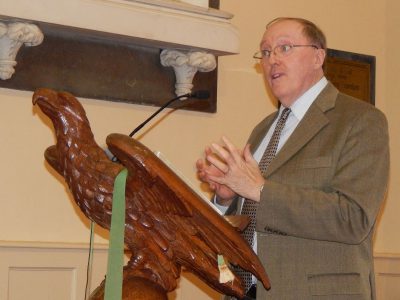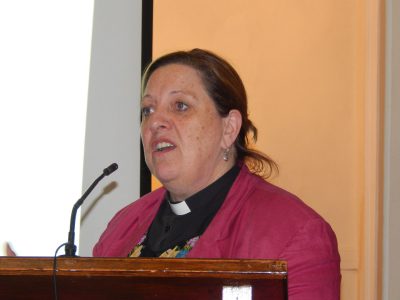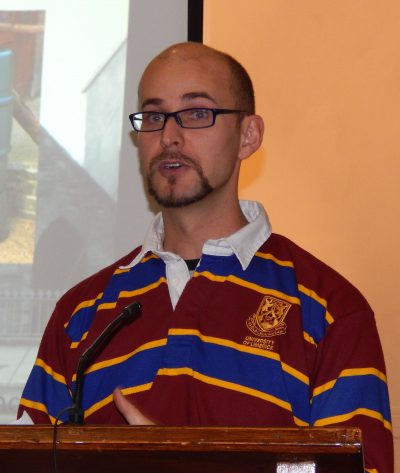“For the first time in human history, climate is the prisoner of people.” That was the view expressed by Emeritus Prof John Sweeney of NUI Maynooth at an event Eco-Congregation Ireland co-hosted with Carrigaline Union of Parishes in Cork on 7th November.
Addressing the topic Climate Justice – Cork? Ireland? The World?, Prof Sweeney quoted the Fifth Assessment Report of the Intergovernmental Panel on Climate Change (IPCC) that states there is a strong relationship between historical carbon emissions and rising global temperatures.
 “Limiting climate change will require a substantial and sustained reduction of greenhouse gas emissions,” Prof Sweeney said. “There are approximately two decades left to achieve the large-scale decarbonisation necessary to avoid dangerous climate change.”
“Limiting climate change will require a substantial and sustained reduction of greenhouse gas emissions,” Prof Sweeney said. “There are approximately two decades left to achieve the large-scale decarbonisation necessary to avoid dangerous climate change.”
Admitting this was “a very stark message”, he went on to emphasise: “We have to act now with each country playing its part by adopting energy-saving strategies and reducing consumption of fossil fuels.”
Describing as “crucial” the COP21 climate talks that will take place in Paris in 2015, Prof Sweeney said he hoped an inclusive global agreement would be made at that event, adding that he believed it was economically affordable to prevent runaway climate change. “A global agreement to halt the rise of greenhouse gas emissions sometime in the next decade is essential to avoid dangerous climate change,” he said. “Some form of agreement is likely to emerge based on a mix of ‘top down’ and ‘bottom up’ commitments.
“Commitments will likely become legally binding in 2020. Whether it will be enough for the atmosphere, or simply face-saving for the politicians, is not yet clear.”
Noting that Irish carbon emissions are increasing again as the recession recedes, he said Ireland would not meet the greenhouse gas reductions we have already signed up to. “We are not taking it seriously at a political level,” he said. “Our political leadership is not putting the emphasis on climate change … but we shouldn’t simply be looking at national self-interest.”
Prof Sweeney, who was one of the contributing authors and a review editor of the IPCC’s Fourth Assessment Report, said that, while it is extremely difficult to give accurate predictions for the future, the most recent IPCC report states that a gradual rise in temperature of between 0.3 – 0.7 degrees Celsius will take place by 2016-2035 (relative to 1986-2005) and that there is a 50% chance of a rise in temperature of 4 degrees Celsius by 2081-2100 (relative to 1850-1900). “We will see more rainfall in places where it is not needed (e.g. Ireland) and less where it is needed more (many developing countries),” he said.
“Greenland has been melting much more quickly in recent years and Antarctica is melting too: it has decreased by 4% per decade since 1979. This is adding water into the global ocean, which is resulting in rising sea levels. Sea level in the early 21st century is rising twice as quickly as in the 20th century. Today global mean sea level is 10-20cm higher than in the early 20th century.”
Prof Sweeney went on to say that climate change, which is already underway, is now estimated to cause over 150,000 deaths annually. “That’s 30 times the number of people who will die from Ebola this year,” he said. “These deaths are mainly occurring in the developing world where, if the rains fail, the social fabric collapses. We’ve seen this in African states in recent years as well as low-lying islands, and we’ve seen evacuations take place already. The Nile delta and Bangladesh are the most vulnerable to rises in sea level.”
Ireland emits more greenhouse gas emissions than the 400 million poorest people on earth. Recalling the 70,000 deaths that took place in 11 days during the August 2003 heatwave in Europe, he said that type of event is likely to occur every second year in 40-50 years’ time. An increased seasonality in rainfall in Ireland will cause water shortage in the east and flooding in the west of the country.
These are the kind of hazards we need to plan for in Ireland, according to Prof Sweeney. “A typical Irish person’s water footprint is 3,600 litres of water a day,” he said, adding that it takes 5 litres of water to produce a one litre plastic bottle of water.
 The kinds of landscapes in Ireland under threat from climate change include bogs, turloughs and machair. Vulnerable species include salmon, the curlew, the Kerry slug, the Irish damselfly, the water beetle and the buzzard.
The kinds of landscapes in Ireland under threat from climate change include bogs, turloughs and machair. Vulnerable species include salmon, the curlew, the Kerry slug, the Irish damselfly, the water beetle and the buzzard.
Noting that infrastructure in Ireland has already been affected (e.g. the railway line near Killiney, Co Dublin, has been moved inland) and 14,000 Cork addresses are 4 metres or less above sea level, Prof Sweeney concluded: “It makes sense to spend money today to stave off problems for tomorrow.”
Following the talk, members of two eco-congregations, Carrigaline Union of Parishes and Clonakilty Methodist Church, gave presentations about how their churches have taken steps
 to ‘green’ their churches. Carrigaline was presented with an Eco-Congregation award in recognition of the eco initiatives they have undertaken in the past two years (Clonakilty has already received two ECI awards)!
to ‘green’ their churches. Carrigaline was presented with an Eco-Congregation award in recognition of the eco initiatives they have undertaken in the past two years (Clonakilty has already received two ECI awards)!
Prof John Sweeney said he has always been a great admirer of Eco-Congregation: “It is a very difficult task to motivate people but I think you’re doing a great job, so well done!
“It was a pleasure to learn of the widespread activities of Eco-Congregation in bringing an ethical and practical dimension to combatting climate change in Ireland,” he added. “Eco-Congregation provides a dynamic that is inspirational, and the sense of community which this ecumenical organisation fosters offers a template for what needs to be done at national and international levels to address the complex problems involved in translating local action to global benefits.”
